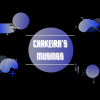KWICK 6 #020: Book Round-up
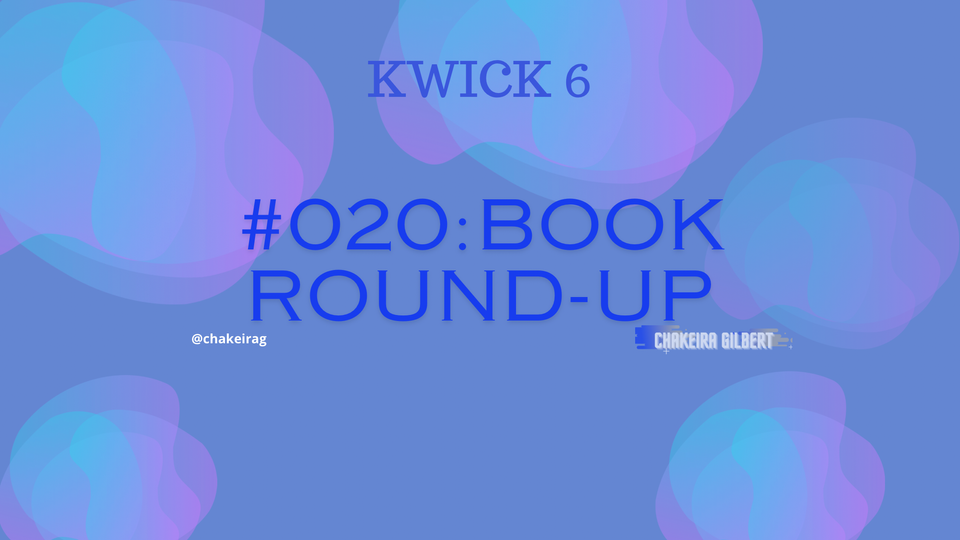
🤔 Thought of the Week
What is most important to me? I think many people ask themselves this question in various situations. Lately, this question has been floating in my mind regarding my career. I enjoy the work that I do. I enjoy the challenge of finding answers to tough questions regarding contract law. I also love reading and writing. The problem is that lately, my job has been draining so much of me that it has been difficult for me to write and read. Well, I've been reading, but mainly Kindle Unlimited books that can be read on a weekend. I haven't been able to read complex science fiction and fantasy books like I've wanted. I want, no, need to get back to not letting my job drain and stress me out. Thankfully, I have been able to get into the swing of things in August, but I need to find a consistent practice where the job doesn't take away the joy from other endeavors.
💻 What I've Consumed
It has been so long since I've written a KWICK 6 that I have consumed many great things and DNF'd some things. But I will focus on my August reading.
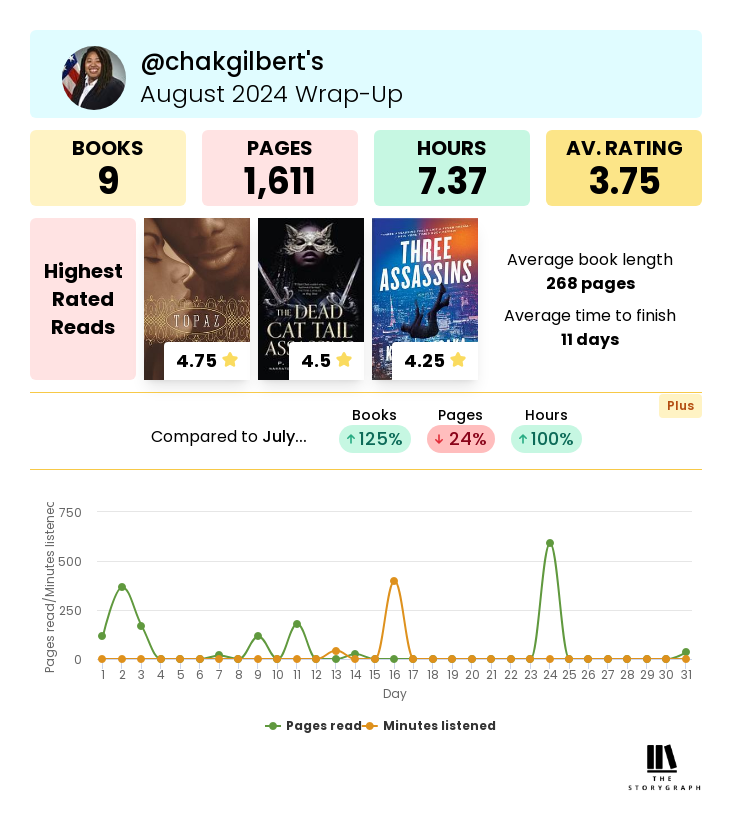
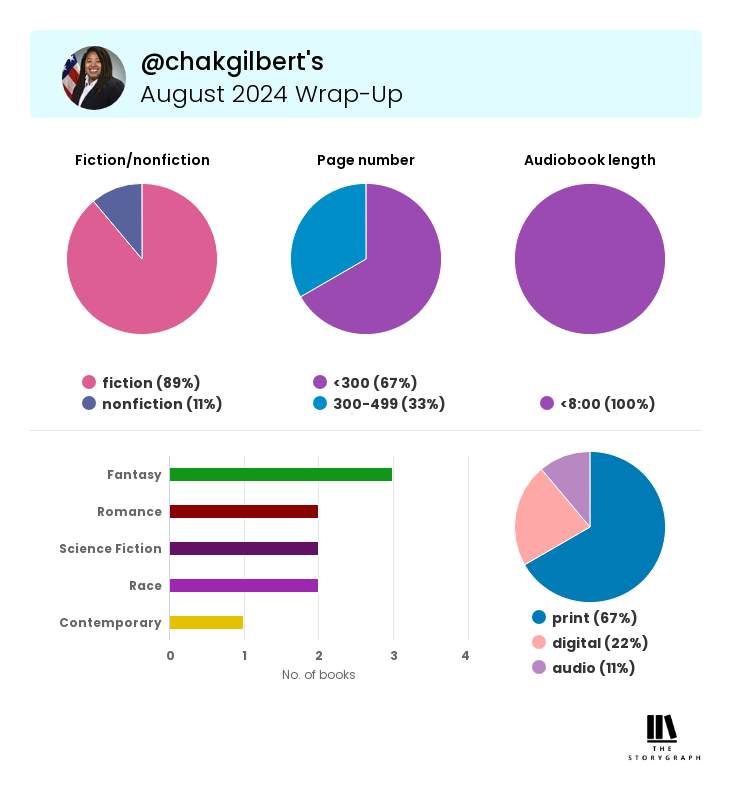
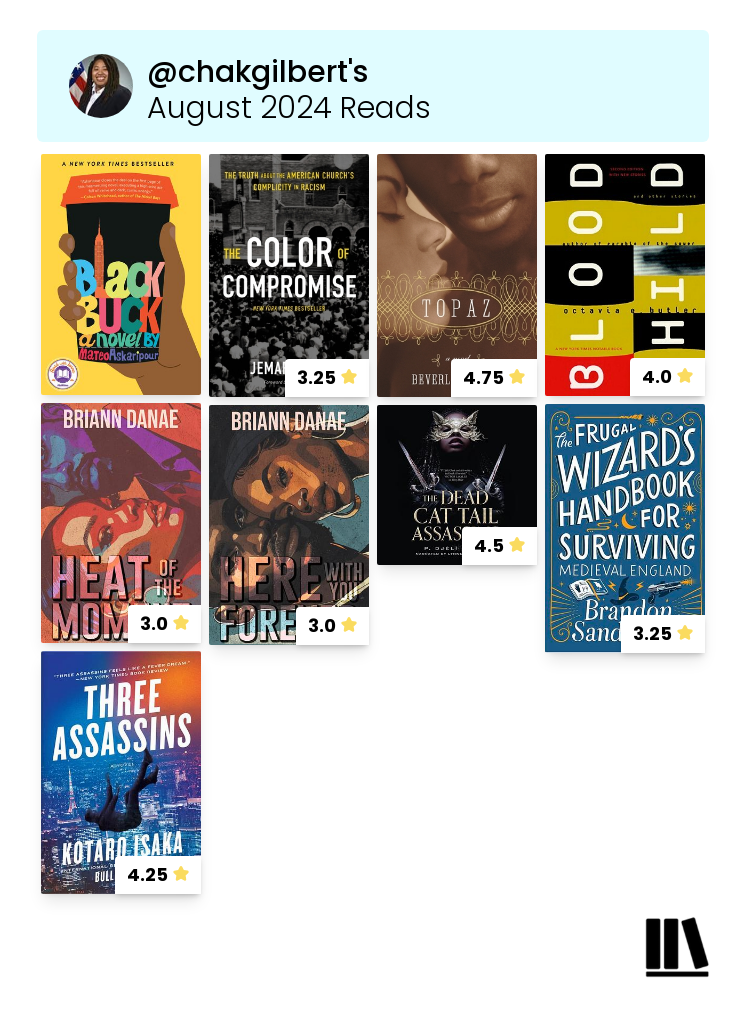

StoryGraph Wrap-Up graphics and recently read books.
The Color of Compromise
I have started and put down this book so much. It took me no less than three or four times to get through this. It's not because it's a bad book, but because a lot of the information was already known to me and offered nothing unique. It’s one of those books I wonder who it was written for, and I think in this case, it’s written for people who do not understand racial history in this country, do not understand racial history in the church, and who are beginners and they are discovering racial reconciliation. And that’s totally fine, but it wasn’t what I wanted or expected in the book. Tisby goes through a broad survey of history in the church as it relates to race relations in this country, and I think this book is an excellent resource for quickly pointing to something of that nature. But I don’t think the book is suitable for people reading history or diving into race relations extensively. This book would be good for a book club with mixed company, and what I mean by that is both knowledgeable people in this area and beginners. As a matter of fact, this may be a good book to teach to the youth because it has a lot of historical context, but it’s simple enough to read. So, with that said, the end of the book presents ways that people could be involved with racial reconciliation in the world today, and I will state that reading this in 2024, some of the areas are out of date, but for the most part, I believe that the information is still relevant. I can’t give this book higher than a 3.25⭐️ rating just because it offered nothing new to me. I recommend that people add it to their TBR, but if you regularly read history, then this is not a must-read now. I can see myself using this as a resource for youth ministry and things of that nature if I get back into that area, particularly due to its focus on racial reconciliation.
Topaz
This book is a historical fiction romance novel by Beverly Jenkins, one of my all-time favorite authors. It follows Kate Love and Dix Wildhorse after Love's trouble-causing father arranges their marriage. You follow their journey back to Indian Territory, with history mixed into the narrative. Love is a journalist who finds herself mixed up in some trouble, and Dix is a Marshall. This slow-burn romance displays some of the thinking during that time while also showing the characters' humanity. I will say the ending felt rushed. One of the things I love about reading Jenkins is the history woven in and the resources to read more. There have been plenty of times when I will read her books and then find articles or books about the topic. I rated this book 4.75⭐️. It is a story I come back to periodically. I recommend this book.
Bloodchild and Other Stories
This is my official start to reading Octavia Butler's books. This short story and essay collection is a great way to delve into her concepts and thought processes. Some of the stories I enjoyed, and some I did not. It has an element that allows you to explore different aspects of life, such as what would happen if you had the power to change one thing about humanity and the unintended consequences of that change. Also, one of the essays gave great tips about being a writer and being persistent. The first story, Bloodchild, is weird and made me think a lot. I watched videos regarding the story after I had read it. It is disgusting in some ways but thought-provoking.
My favorite was Amnesty because it was creative and imaginative. I finished it and wished it was longer. What would you do if aliens abducted you as a child and then decided to work for them? This exploration was well done. Overall, I would recommend this collection as an introduction to her work and as an introduction to her as an author. I also enjoyed her explanation of what she was thinking about when writing the stories. It gave me a way to get inside her head after coming to my conclusion about the stories. I rated this 4⭐️ because while there were some great stories, there were also some duds.
The Dead Cat Tail Assassins
P Djeli Clark is quickly becoming one of my favorite authors. The Dead Djinn Universe is a great collection of novellas and a full-length novel, and this new novella is a fun read, pushing Clark to my must-read list. This story follows Eveen, a dead assassin who has wiped memories sworn to work for the Matron of Assassins. She is a morally complex character, funny, and breaking rules. I listened to this on the way to North Carolina, and it captivated me. It was action-packed and fast-paced. The mystery of why Eveen had a memory, who the girl she was sent to kill was, and who got her into this mess was a fun exploration. Like with many novellas I read, the worldbuilding isn't fully developed, and some of the characters aren't distinct, but I had a good time listening to this on the drive. The end did slow down a bit and seemed to have more dialogue, but I can see myself rereading at some point, especially if more books are set in this world. 4.75⭐️. I recommend.
The Frugal Wizard's Handbook for Surviving Medieval England
Sanderson is a rock star writer online, and I am slowly reading some of his books. This is my 3rd book. I won't lie; I am not a fan of Sanderson's humor. He isn't that funny to me, but this book and Tress are fun books to read. Here, we follow a man who wakes up in medieval England without remembering who he is and with an incomplete handbook. As the story progresses, we learn more about the world and the character, and he also learns about those aspects. The book has some pacing issues. Some of the reveals felt rushed, and some ethical dilemmas that this world creates didn't seem thought out by the characters. I did not enjoy the romance aspect of the book. It didn't build up too much and seemed to come out of nowhere at the end. The concept was interesting, but the execution could have been better. Overall, I thought the book was okay, and I liked it. It was a great weekend read meant to be fun and not taken too seriously. I don't see myself coming back to reread it. I would give the book a 3.25⭐️. I would recommend it, but you don't have to stop what you are doing and read it now. Add it to your TBR and read it when you're in the mood for a lighthearted adventure story.
Three Assassins
I believe this book was meant to be read before Bullet Train, but since it was translated and released after Bullet Train, this is how I experienced it. In Bullet Train, both the movie and book, a teacher seems out of place in the story. He has wise words, and I wondered about his backstory. Three Assassins introduces the backstory of that teacher. Suzuki joined Faulein, a criminal organization, to get revenge for his dead wife, who died in a hit-and-run. His cover story is not great, and his target gets pushed into traffic. Suzuki chases the suspect, who is believed to be the Pusher. He meets the man and his family and must decide whether to pass the information along to the gang, even if he is unsure if the man is The Pusher. The other two assassins, The Whale and Cicada, are both determined to find Suzuki and, ultimately, The Pusher for two different reasons. All three of these points of view converge as the story goes on. The POVs are distinct, and the story is fast-paced. While this story takes place before Bullet Train, it is a standalone. The writing styles are similar, and there are multiple distinct characters. The Pusher has a minor role in Bullet Train as Morning Glory, and the Hornet is included in both. I really enjoyed this book. While I did not like it more than Bullet Train, I do recommend it with a 4.25⭐️ rating.
Black Buck
I did not finish this story. I stopped around 44% and honestly could have stopped earlier. This book follows Darren, who initially works at Starbucks and then gets an opportunity to work in sales at a start-up. His mom, girlfriend, and everyone around him say he is not living up to his potential because he graduated top of his class. My issue with the book is two things. 1) Daron does not, or rather, he is not a likable character. While that usually does not bother me and impacts my enjoyment of a book, it prevented me from enjoying it here. He irritated me, and it could be because he’s a young person trying to navigate the world, and I’ve already been through that. Or it could have been because while he seemed to subvert the stereotypes of black men, in some ways, his character leaned into them. 2) The book is supposed to be satire; however, it doesn’t read like a satire. It wasn’t funny to me and did not seem over the top. It seemed too realistic, making me wonder who the author was writing to. Was he writing to Black people, or was he writing with the white gaze in mind? And I think that matters because when you’re reading a book dealing with microaggressions at work, some of the stuff was over the top, but many of it was things people in the corporate world deal with or have dealt with. So, I didn’t understand where the book's satire came from. I tried to push through and read the whole book, but I got through chapter 15 and couldn’t continue reading. This book didn’t compel me to pick it up. I did not want to know what happened. It felt very Wolf of Wall Street, so I felt like I could determine where the story was going. After reading some other reviews and getting an idea of the ending, I realized that it may not be very satisfying, especially to black readers, and, not knowing the purpose of the story, I decided that I didn’t want to finish the book. However, I am interested in reading more from the author. I enjoyed the book's writing style and felt like the author had something to say. I just did not enjoy this book, maybe because it was too close to home. So I’m not sure if I would ever come back to this book or if it’s ever adapted if I would watch something like this; it just did not interest me to continue to read essentially light trauma.
📚 Currently Reading
In September, I hope to keep reading good books. I have a working TBR, but it could change based on my mood.
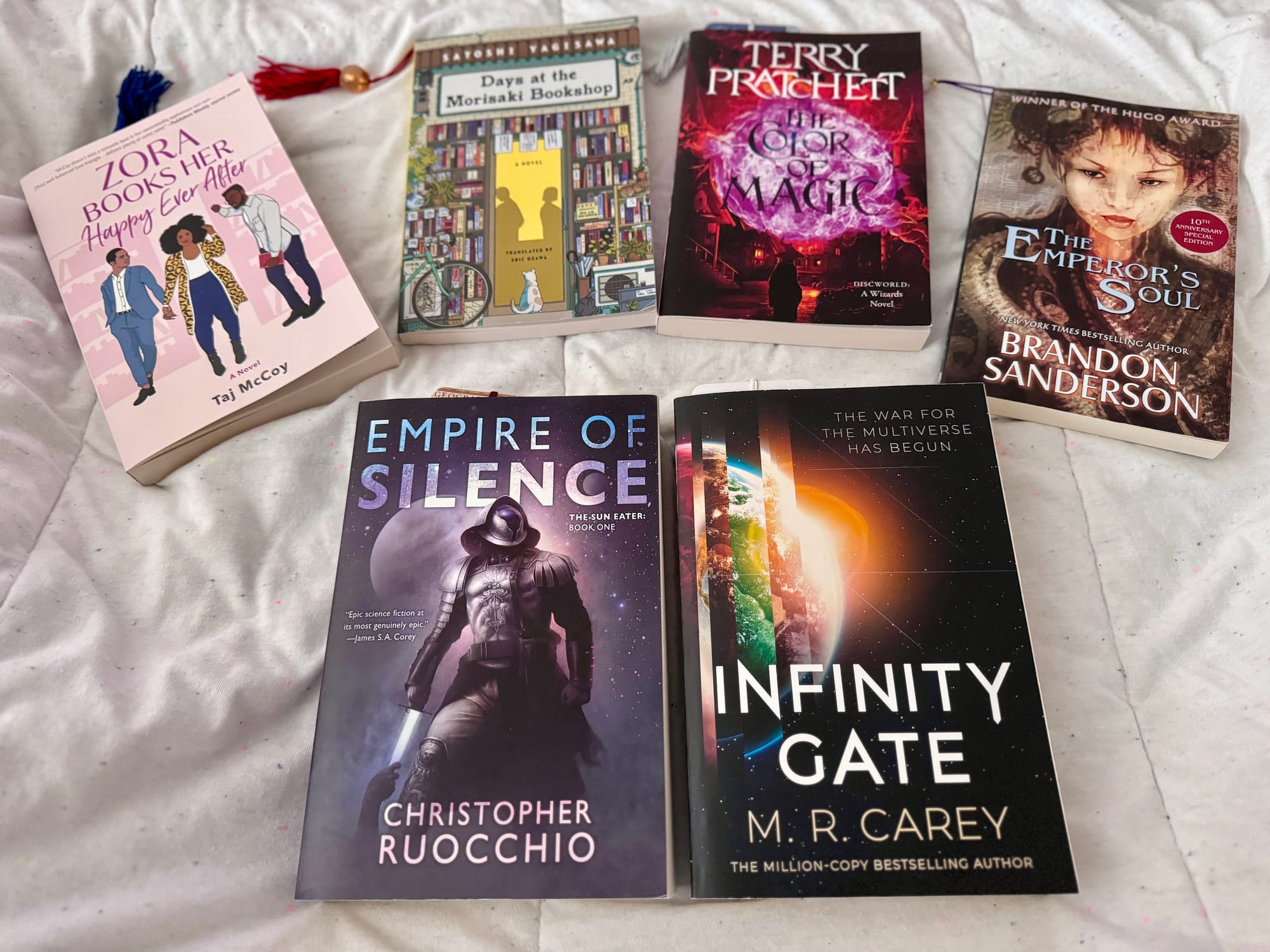
Currently, I am reading the following books, which each involve bookstores:
Zora Books Her Happy Ever After
This is my first book by Taj McCoy, and I saw it in a small bookstore while on vacation in Florida. After reading or attempting to read books with heavier subject matters (The Attic Child and Black Buck), my best friend and I decided to buddy-read a romance. So far, I am enjoying the book. The first chapter had so many instances that made me laugh out loud. It introduced the characters well, and I look forward to learning more about them.
Days at the Morisaki Bookshop
This is a translated work by Satoshi Yagisawa. The first chapter does an excellent job of setting up the characters, the setting, and the conflict. The main character has just learned that her long-time boyfriend has been cheating on her and is getting married. She realized she was the other woman. She quits her job and is depressed. Her eccentric uncle calls her and tells her to come to his bookshop. She can stay for free if she helps out. After reading Bullet Train and Three Assassins, I am more interested in reading translated works. So, if you have any suggestions, please let me know.
💡 Lessons Learned:
I see religion as something that really isn’t controlling people and helping to channel their energy away from destruction. Sometimes it becomes destructive itself. ~ Octavia E. Butler: The Last Interview and Other Conversations, Equal Opportunity Forum
Octavia Butler grew up religious, and some of her stories have religious themes. While reading this book, this statement stood out to me. As much as religion helps people, it also can be destructive to people. In middle school, my parents became more consistent with their faith and made me attend church; in high school, they became much more strict regarding certain things. As often as I heard that King David was a man after God's own heart, there was not much about how he used his power to destroy lives. I was told his story is about redemption. The church, like America, focuses on the positives and the "greatness." They do not want to talk about the destruction. When that destruction is not known or understood, destruction tends to repeat itself. So, while I agree with Butler to a point, sometimes I also see religion as a controlling mechanism to create destruction to gain power. Believers of any kind have to be willing to point out the destructive nature of the system of religion as often as the benefits.
If you need some recommendations, check out my Goodreads or StoryGraph. And then follow me on Instagram and Twitter. One of my favorite newsletters to read for current events is Morning Brew. Check it out.
